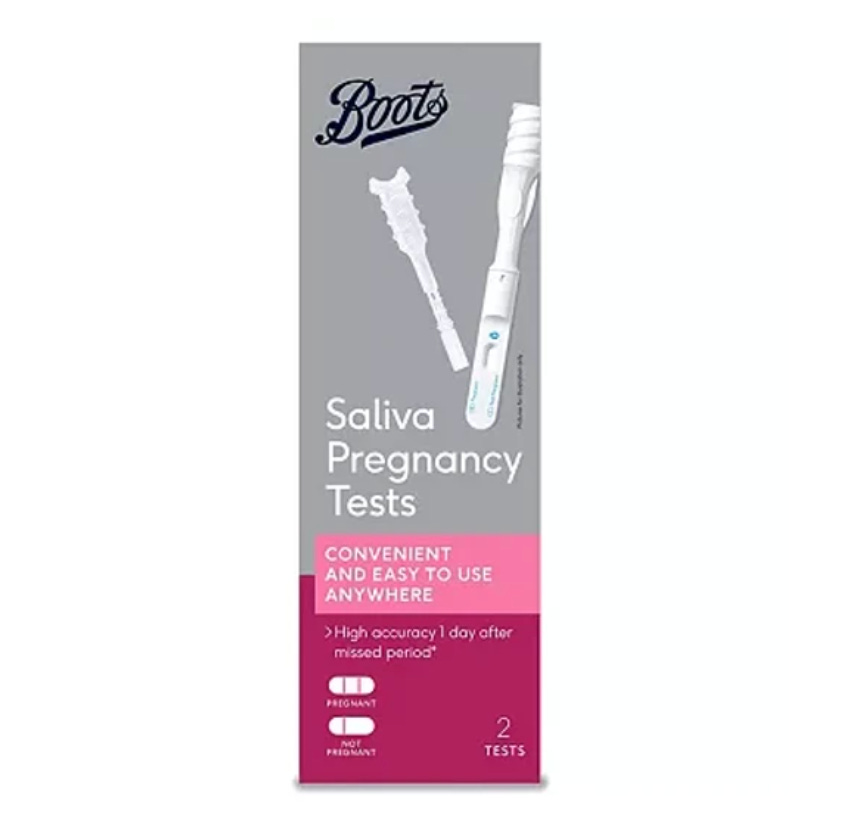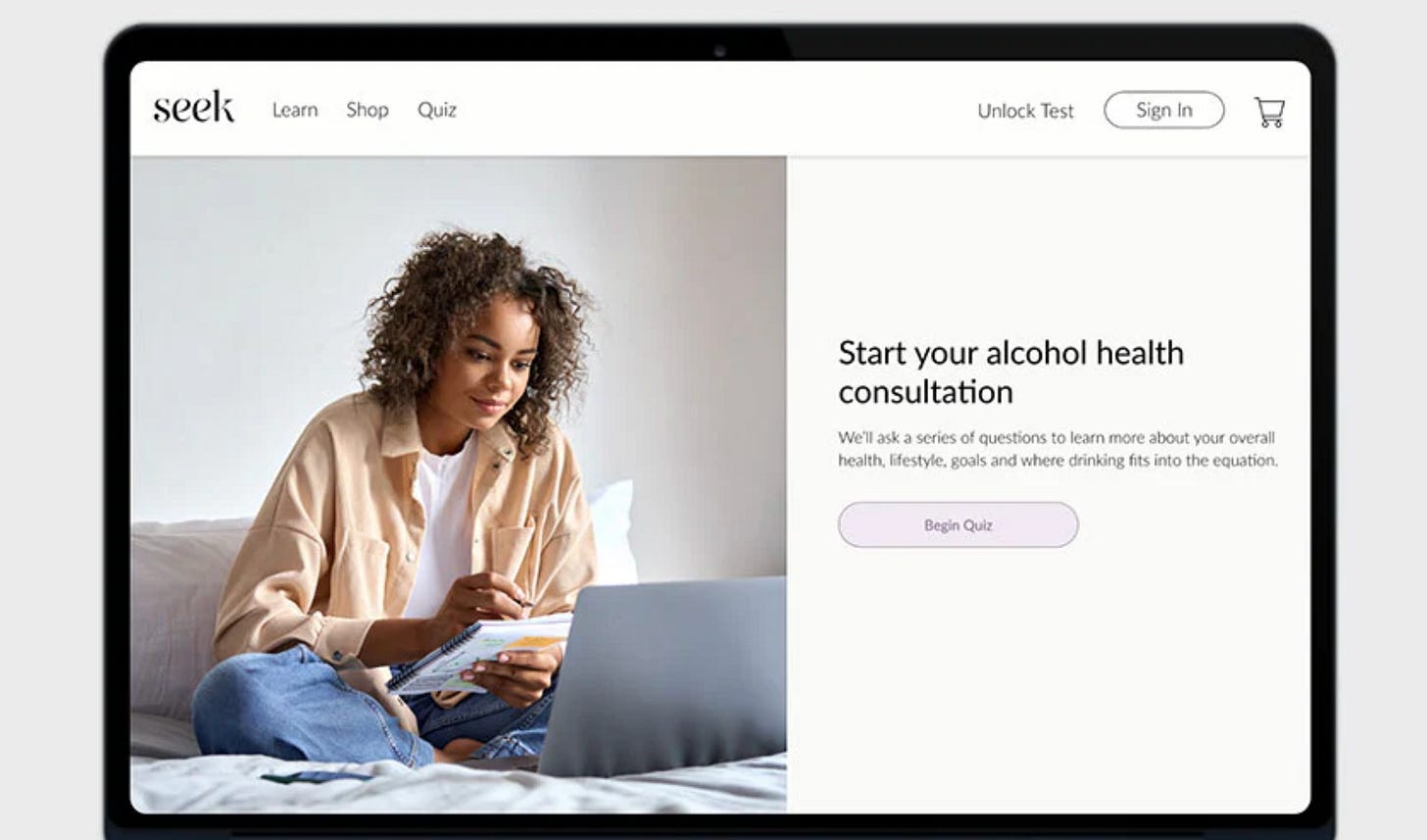Issue 54: Clue & Oura menopause research | world-first saliva pregnancy test | at-home alcohol test | FDA-clearance for bladder device
+ lots more in your weekly round-up of women's health innovation and FemTech news
Welcome to issue #54 of FutureFemHealth, here to bring you your weekly news about women’s health innovation and FemTech (w/c 21 May 2024).
We crossed 1,000 subscribers this week. Thank you for all being here and for getting in touch with me with your news and feedback each week too.
🌟 Coming up today we’ve got:
🩸 Clue, Oura and UC Berkeley partner for menopause research
📈 World-first saliva pregnancy test launches in Boots
❤️ Seek launches first at-home alcohol test for women
✅ Yōni.Fit bladder leakage device obtains FDA clearance
Got news to share from the world of FemTech and women’s health innovation? Let me know at anna@futurefemhealth.com
Will the Clue cycle tracking app soon be able to detect perimenopause?

Over the age of 45, perimenopause can typically be diagnosed by a medical practitioner based on symptoms alone. But what if your cycle tracking app could spot that you might be perimenopausal based on the symptoms you’re tracking?
That seems to be the thinking behind a new partnership between period tracker Clue, wearable Oura ring, and the University of California, Berkeley.
The trio have teamed up on menopause research, using data from the Oura ring, a survey, and the Clue symptom tracker to quantify when someone is entering perimenopause and how far they are into the journey.
Already the partnership has discovered that women aged 45-54 are 56% more likely to tag migraine and 57% more likely to tag hot flushes than women aged 25-34.
Last year, Clue turned on a ‘perimenopause mode’ in its app, paving the way to help more users understand more about this phase of life. And the app began its partnership with Oura ring last November because Clue users said that body temperature tracking — a specialty of the Oura ring — would be most valuable biometric for them.
There’s a lot to consider if Clue does go down this path. Should you only provide perimenopause information to a user who has activated perimenopause mode? How do you confirm if perimenopause is the cause of the symptoms being experienced? These are crucial questions that need addressing.
However, Clue's recent finding that 70% of women aren’t even sure what perimenopause is highlights an even more significant challenge. Educating and raising awareness about perimenopause will continue to be a major focus.
(Full story: FutureFemHealth)
📦 UK: World-first saliva pregnancy test launches in Boots retailer
It’s close to 50 years since the first at-home pregnancy test appeared in drugstores and chemists.
Only recently have we started to see signs of disruption.
Now comes a long-awaited shake-up: a world-first pregnancy test that uses saliva instead of urine.
Boots has announced it will be the first in the UK to sell the test, from Abingdon Health, under its own brand label.
That’s important. Because although the test has been sold under Abingdon’s ‘Salistick’ brand in Superdrug and Tesco since 2023, the Boots own-brand label will raise the profile of the test even further and reassure customers through the existing trust they have with the retailer.
As Salignostics Ltd co-founder Guy Krief sums up:
“Boots is the leading health and beauty retailer in the UK and offering our saliva pregnancy test under their own brand label will drive consumer education, confidence and adoption of the platform.”
Full story: FutureFemHealth
💰 Funding, deals and investment news
📌 US: Amplexd Therapeutics raises $2m for cervical precancer. Amplexd is developing two low-cost, non-invasive therapies to treat cervical precancer. The goal is to provide more access to potentially life-saving care for those in low and middle income regions. Backing came from an Asia-based family office. (Continue reading: Finsmes)
🌟 More news from this week
📌 US: Seek launches first at-home lab test for impact of alcohol. Founder Katie Garry spent years trying to understand how alcohol impacted her health after getting abnormal blood work back that her doctor thought could be attributed to drinking. Katie has developed ‘Seek’, a $134 at-home-test specifically for women that analyses biomarkers across core health categories that are sensitive to alcohol consumption. This unlocks insights into how drinking might affect health. (Continue reading: FutureFemHealth)
📌 US: Yōni.Fit bladder leakage device obtains FDA clearance. Up to two-thirds of women in the US will experience urinary incontinence at some point in their lives. And while treatment, repair or surgery is the ultimate goal - often for many sufferers there will be a period of needing to wear bulky pads to deal with leaks. The Yōni.Fit is an alternative, temporary, option - a silicon medical-grade vaginal insert that instantly stops bladder leaks yet doesn’t interfere with voluntary urination. FDA clearance opens up access to this non-surgical way to manage urinary incontinence. (Continue reading: FutureFemHealth)
📌 UK & USA: Period trackers ‘coercing’ women into sharing risky information. A new study of 20 of the most popular female health monitoring apps suggests poor data-management practices including some not having a delete function for sensitive information, and personal data still being shared with third-parties. “There is a tendency by app developers to treat period and fertility data as ‘another piece of data’ as opposed to uniquely sensitive data which has the potential to stigmatise or criminalise users,” said Lisa Malki, one of the study’s authors. Interestingly, this research - which you can see in full here - has been funded by Google so focused on Google Play Store apps. (Continue reading: King’s College London)
📌 US: Labcorp unveils first-trimester blood test for detecting preeclampsia risks. Preeclampsia can develop into one of the main causes of maternal and fetal mortality if left untreated. The Labcorp blood test can be used at weeks 11-14 to identify risk scores for the condition. Existing methods such as hypertension or proteins in urine tend to be used at 20 weeks plus. (Continue reading: Fierce Biotech)
📌 US: ’Motherhood isn’t controversial, censorship is’: After Swehl’s lactation cookie ad was removed from Times Square last week for being ‘inappropriate’, probiotics brand Seed stepped in to donate its own billboard space. As Seed co-founder Ara explained: “The removal and subsequent national outrage underscores and unacceptable double standard: a sexualised breast is acceptable, but a nursing or lactating one is not.” (Source: Seed on instagram)
📌 The secrets sperm carry. Male infertility is a women’s health issue. And while several missed periods might signal to a woman that she should book a primary care appointment, men simply have no equivalent check engine light. Maven’s Neel Shah explores why a semen analysis could be a critical biomarker for a man’s overall health - and be part of unburdening women from shouldering all of the physical intervention through fertility issues. (Continue reading: Neel Shah on Substack)
📌 Robots and AI - is this the future of IVF? Conceivable Life Sciences is building robots and AI to automate crucial parts of IVF. The robots, for example, will be able to suck sperm into needles and place them into eggs - automating what we know as intracytoplasmic sperm injection (ICSI). Co-founders Joshua Abram and Alan Murray hope to challenge an industry based on somewhat arbitrary decision-making, although some are sceptical about the approach. (Continue reading: Business Insider)
🩸 Research and women’s health news

📌 Thyroid disease: the women’s healthcare crisis that noone talks about. Brain fog, depression, low energy levels are just some of the many symptoms you might experience with a thyroid condition. And one in eight women will develop a thyroid condition in their lifetimes. Yet it can take years to get a diagnosis and often a long time to get the right treatment too. Like many areas of women’s health there simply isn’t enough research, medical training or awareness around thyroid disorders to change this. Campaigners now call for inclusion in policy and a taskforce to tackle gaps. If like me, you didn’t know much about the thyroid, this piece is worth a read. (Continue reading: Evening Standard)
📌 GLOBAL: How ignorance and gender inequality thwart treatment of a widespread illness. Tens of millions of people have female genital schistosomiasis, a neglected tropical disease that few physicians (let alone most of the general public) have even heard of. But efforts are underway - including through diagnostics, treatments and awareness-raising - to move it out of obscurity and get women and girls greater access to sexual and reproductive healthcare. “The fact that there’s a parasite that’s easily treatable with a dose of praziquantel that costs very little and that can change the outcome of a woman’s life, and we’re not doing that, is absolutely shocking,” says sufferer Delphine Pedeboy-Knoetze. “Shame on the global-health community and shame on the medical community for this.” (Continue reading: Nature)
📄 Govt & policy news
📌 UK: Govt launches consultation on Relationships, Sex and Health Education guidance in schools. The consultation recommends delaying sex education for children under nine years old, but would introduce menstrual and gynaecological health (including heavy menstrual bleeding), PCOS and endometriosis to the curriculum for secondary school students. (Source: Schools Week)
📌 UK: Five ‘must-dos’ for the next UK Government. The Royal College of Obstetricians and Gynaecologists (RCOG) has set out a manifesto for change after the upcoming election. The organisation calls for prioritised investment in women’s health; high-quality, personalised and safe maternity care; a joint taskforce for gynaecological waiting lists; increased investment in sexual and reproductive health and rights as part of international development policy in low and middle income countries; and abortion law reform to firm up fundamental rights for abortion access. (Continue reading: RCOG)
📌 US: New task force prescribes mental health support to curb maternal deaths. The leading causes of pregnancy-related deaths in the United States - including suicides and fatalities linked to substance use disorders - stem from mental health conditions. The Maternal Mental Health Task Force, formed in September last year, recommends that maternity care centers could serve as hubs of integrated care and birthing facilities, building upon services already in communities. (Continue reading: NBC News)
✅ Jobs
📌 US: Chief of Staff / Special Projects Lead, Mae Health
📌 US remote: Director, Solution Sales / Enterprise Sales, Mae Health
📌 US: Social Media Manager, Mira
📌 Stockholm: Product Manager - App features, Natural Cycles
📌 London, UK: Head of ASO, Flo Health
📌 London, UK: Head of SEO, Flo Health
📌 Berlin, Germany: Senior UA Manager (1 yr), Clue
That’s all for this week! I’m away next week so the newsletter will be back in your inbox again on 5 June. Keep up-to-date in the meantime over on our LinkedIn page.
Anna





